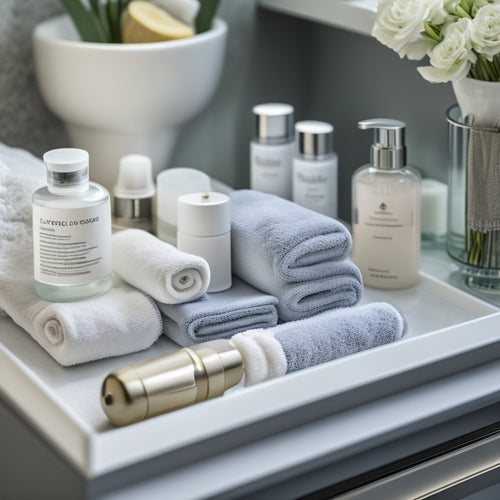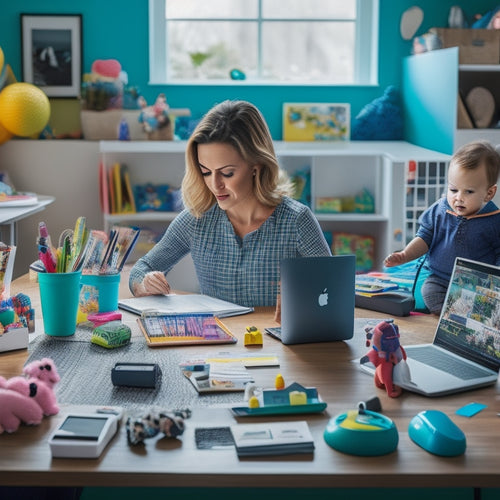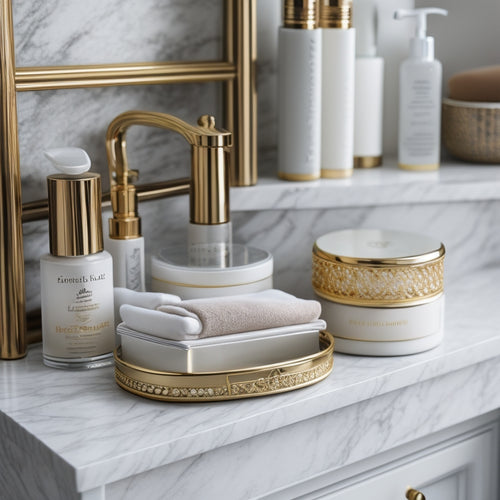
Puppy Potty Training Pro Tips Revealed
Share
You're about to discover the secrets to successful puppy potty training. Establishing a consistent daily schedule for feeding, exercise, and potty breaks is essential to create a sense of security and predictability. Supervise your puppy closely, especially in early stages, to prevent indoor accidents and reinforce good habits. Confining your puppy to a small, puppy-proofed area when you can't watch them will also help prevent accidents. Remember, staying calm and composed when mistakes happen is pivotal. By following these pro tips, you'll be well on your way to potty training success - and there's more to come.
Key Takeaways
• Establish a consistent daily schedule for feeding, exercise, and potty breaks to create a sense of security and predictability for your puppy.
• Supervise your puppy closely, especially in early stages, to prevent indoor accidents and reinforce good habits.
• Confine your puppy to a small, puppy-proofed area when you can't watch them to prevent accidents and ensure their safety.
• Stay calm and composed when dealing with accidents, and immediately take your puppy to their outside bathroom spot to reinforce good behavior.
• Plan ahead for times when you'll be absent by arranging for bathroom breaks or setting up an indoor elimination area to maintain potty training progress.
Establishing a Routine Matters
Set a consistent daily schedule for feeding, exercise, and potty breaks to create a routine that helps your puppy learn when it's time to go outside and when it's time to hold it in. A consistent schedule yields effective results, as it teaches your puppy to associate specific times with specific actions.
By sticking to a routine, you're providing your puppy with a sense of security and predictability, which is essential for successful potty training. Routine reinforcement leads to positive outcomes, as your puppy will learn to hold their bladder and bowels until it's time to go outside.
Supervision Is Key to Success
Your puppy's freedom in the house should be directly tied to your ability to supervise them, as unsupervised time can quickly turn into opportunities for accidents. When you're not watching, your puppy can easily slip away and have an indoor accident. That's why it's essential to keep a close eye on them, especially in the early stages of potty training.
Consider leash training your puppy in the house to help you keep them on a short leash, literally. This will allow you to react quickly if you see them start to sniff or circle, indicating they need to go outside. By supervising your puppy closely, you can prevent indoor accidents and reinforce good habits.
Confining to Prevent Accidents
When you can't keep a watchful eye on your puppy, confine them to a small, puppy-proofed area to prevent accidents from happening in the first place. This is especially important during times when you're busy or away from home.
Using a playpen or baby gates, set boundaries that restrict your puppy's access to areas prone to soiling. This confinement area should be comfortable and safe, allowing your puppy to move around and play freely. Make sure to puppy-proof the area by removing any hazardous items and providing adequate ventilation.
Dealing With Inevitable Mistakes
Accidents will happen, and it's essential that you're prepared to respond promptly and correctly to prevent setbacks in the potty training process. Don't panic or punish your puppy - instead, practice accident forgiveness and focus on positive reinforcement. Here's how to handle mistakes:
-
Stay calm and composed to avoid scaring your puppy
-
Immediately take your puppy to their outside bathroom spot to reinforce good habits
-
Clean the soiled area thoroughly to remove any remaining scent that might attract your puppy to the same spot again
-
Review your supervision and confinement procedures to identify areas for improvement
-
Reward your puppy for eliminating outdoors to reinforce good behavior
Planning Ahead for Absence
As you prepare for periods of absence, it's crucial to develop a plan that guarantees your puppy's potty training progress isn't compromised. You'll need to arrange for someone to take your puppy for bathroom breaks or consider indoor bathroom training.
Setting up an elimination area in your home can be a lifesaver. Designate a specific area, like a puppy pad or litter box, where your puppy can go potty when you're not around. Place soiled rags or paper towels inside the area to attract your puppy to the spot.
Make sure your puppy has enough room for sleeping, playing, and eliminating in a confined space. With a solid plan in place, you can rest assured your puppy's potty training will stay on track even when you're away.
Frequently Asked Questions
How Long Does It Take to Potty Train a Puppy?
You'll be wondering how long it takes to potty train your puppy, and the answer depends on your puppy's age and training timeline. Generally, puppies under 6 months take 3-6 months to train, while older puppies can take up to 9 months.
Can I Potty Train My Puppy at Night?
Did you know 85% of puppies can learn to hold their bladder for 8 hours by 6 months? You can potty train your puppy at night by establishing a consistent nighttime routine, aligning their sleep schedule with yours, and taking them out for a quick potty break right before bedtime.
What Are the Best Puppy Potty Training Products?
You'll need reliable products to reinforce good habits; consider investing in high-quality Potty Pads or Training Mats with odor-absorbing capabilities to make clean-ups easier and encourage your puppy to eliminate in designated areas.
How Do I Handle Potty Training During Winter Months?
You wonder if winter weather will hinder potty training; surprisingly, it can actually help! Bundle up in Winter Woollies and brave the Frozen Floors - the cold will make your puppy do their business quickly, making training more efficient.
Can I Potty Train a Puppy in an Apartment?
You can successfully potty train a puppy in an apartment by adapting to the urban living lifestyle, creating a schedule around your busy apartment routine, and utilizing nearby outdoor spaces for frequent potty breaks.
Related Posts
-

Revamp Your Bathroom Drawers With Custom Organizer
I'm revamping my cluttered bathroom drawers with a custom organizer that's both functional and visually appealing. I ...
-

Momtrepreneurs: Master Organization for Success
As a busy momtrepreneur, I've learned that mastering organization is the key to unleashing my full potential. To achi...
-

Revamp Your Bathroom Drawers With Expert Tips
I'm ready to transform my bathroom drawers from cluttered chaos to serene sanctuaries. First, I'll empty and sort ite...


